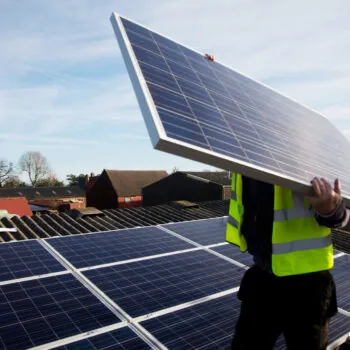Following the coronavirus pandemic, the UK canchart an economic recoverythat putsthe country on track to meet itstarget for net-zero emissions in a way which meets the needs of everyone, now and into the future.
This is the most effective way to build economic resilience.
With the UK co-hosting important UN climate talks next year, it isalso an opportunity for the UK to show globalleadership.
Prime Minister Boris Johnson made clear that the UK Government’s commitment to delivering net zero emissions by 2050 “remains undiminished” by the public health crisis.
There has been a significant decline in emissions, with a decrease in daily global carbon emissions of 17%during the lockdown, and there is now a need as the Prime Minister put it, to “entrench those gains” as the lockdown lifts, by prioritising investment in low carbon infrastructure.
While the immediate policy response to the crisis should rightly focus on improving public health outcomes, specific areas of the resilient net-zero energy economy are very well-positioned to offer high-impact strategic opportunities for driving a robust UK recovery, in both the near and long term. These proposals will create employment opportunities, boost consumer spending and support the levelling up agenda across the UK – with focus on regions most affected by unemployment and inequality.
Key points
- Given the backdrop of economic contraction, substantial debt and increasing uncertainty, investing in the resilient net-zero energy economy represents a strategic no-regrets opportunity for driving a robust green UK recovery in the near and long term
- Investment in net-zero energy infrastructure and energy efficiency projects meet important criteria which indicate that they should be fast-tracked in stimulus measures. They will contribute toward job creation, boost productivity, and improve long-term resilience.
- Specifically, we identify building efficiency, low-cost renewable power generation and system flexibility as high-impact strategic opportunities for driving a resilient net-zero UK economic recovery.
- Stimulus focused on retrofitting buildings to high energy efficiency standards can quickly and reliably ‘level up’ employment opportunities creating 150,000 jobs to 2030 and deliver household savings of £7.5 billion per year that translate into consumer spending.
- Longer term recovery and regional job creation can be powered by harnessing the UK’s offshore wind resource and advancing system flexibility through home energy management solutions and electric vehicle charging facilities.
- These proposals will deliver geographically targeted local employment, reduced energy bills that will improve economic competitiveness and increase the spending power of individual consumers in the near and long term.


